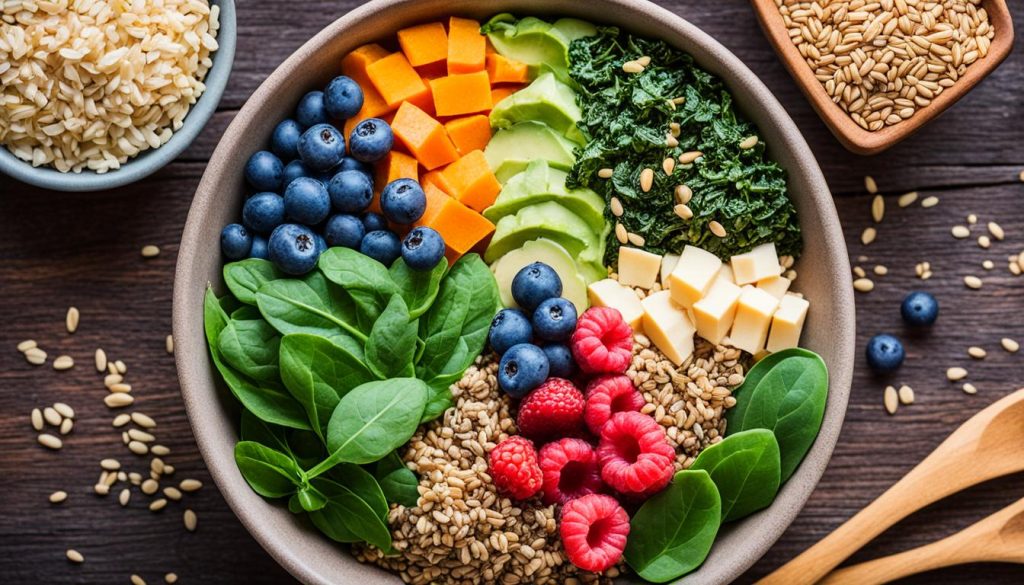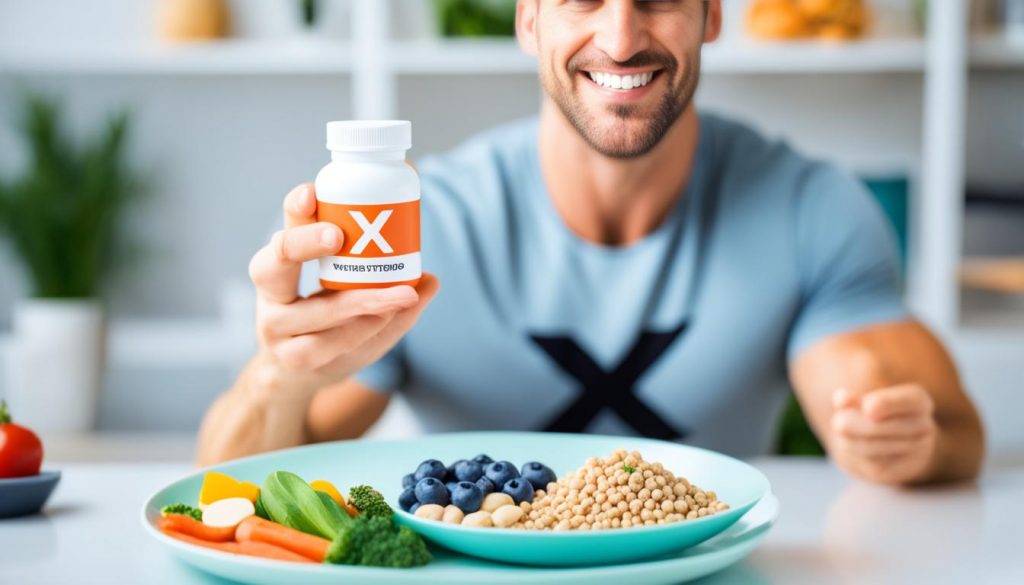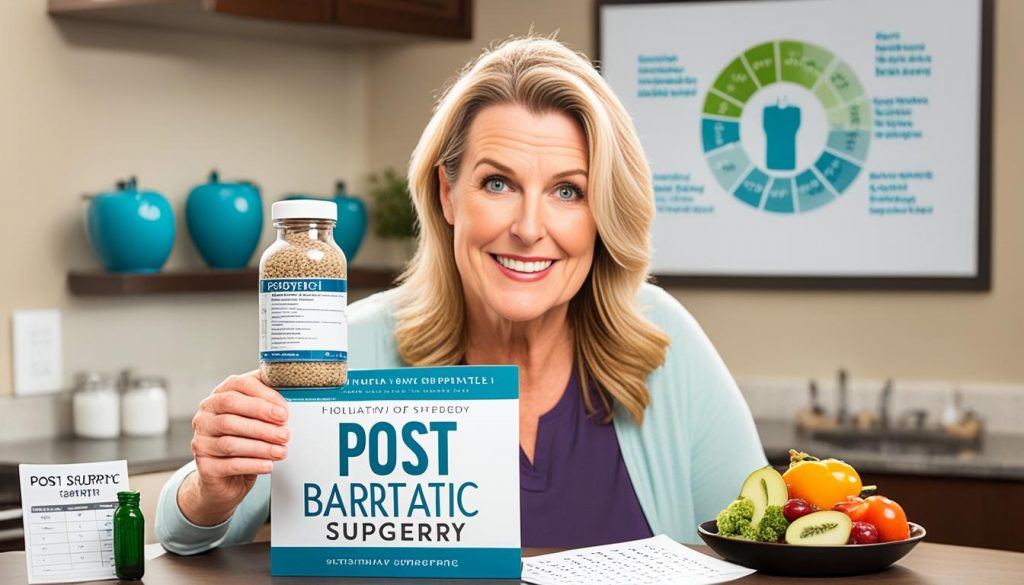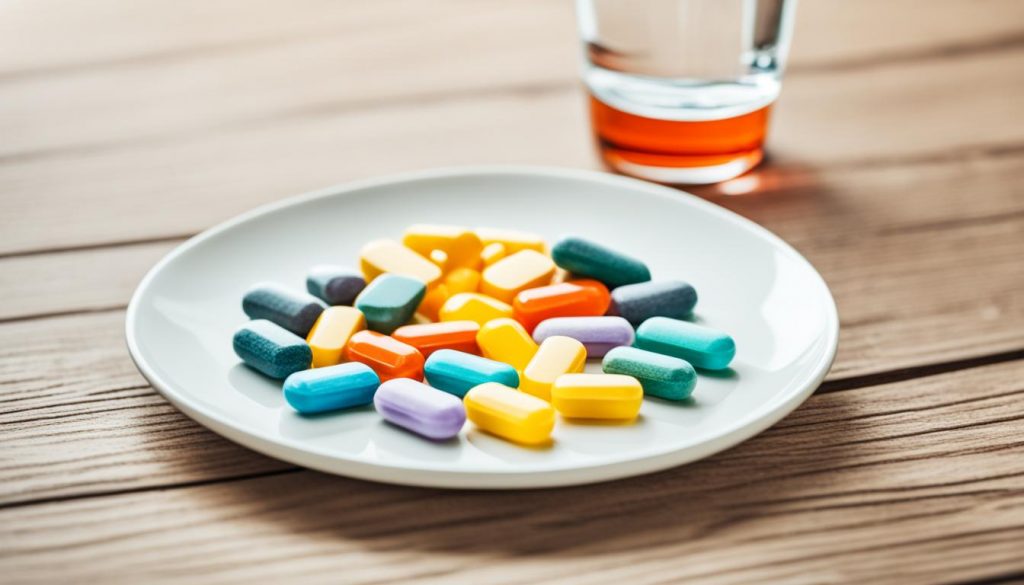Many people like Jane struggle with incorporating enough fiber into their diets due to the shift away from fiber-rich complex carbohydrates in our modern lifestyles. This shift has led to various health issues, including obesity and an imbalanced gut microbiome.
Fiber is essential for gut health and disease prevention, playing a crucial role in maintaining regular bowel movements, keeping us full longer, and supporting a healthy gut microbiome.
While fiber is ideally consumed through a diet rich in fruits, vegetables, whole grains, and legumes, fiber supplements can be a convenient option to bridge the gap between our dietary fiber goals and reality. However, it’s important to understand the best practices for taking fiber supplements to maximize their benefits and minimize any potential side effects.
In this article, we’ll explore when and how to take fiber supplements, their benefits, dosage guidelines, potential interactions, and situations where fiber supplements should be avoided. By the end, you’ll have a clear understanding of how fiber supplements fit into your overall fiber intake and gut health strategy, empowering you to make informed decisions about your well-being.
The Importance of Fiber for Gut Health
Our modern diets have shifted away from fiber-rich complex carbohydrates, leading to obesity and an imbalanced gut microbiome. Fiber plays a crucial role in maintaining gut health and is a key component in disease prevention.
Fiber-rich complex carbohydrates, such as whole grains, fruits, and vegetables, provide essential nutrients and promote a healthy gut microbiome. These carbohydrates are made up of indigestible plant material that passes through the digestive system intact, providing bulk and aiding in regular bowel movements.
Insufficient fiber intake can lead to weight gain and various digestive issues, including constipation and irritable bowel syndrome.
A well-balanced diet rich in fiber can help prevent chronic diseases, including heart disease, type 2 diabetes, and certain types of cancer.

Fiber helps regulate blood sugar levels, promotes satiety, and supports weight management. It slows down the rate at which food is digested, keeping us fuller for longer periods and reducing the risk of overeating. Additionally, fiber has a positive impact on cholesterol levels, helping to lower “bad” LDL cholesterol.
“Eating a fiber-rich diet can greatly benefit your gut health. It provides nourishment to your gut bacteria, promoting a diverse and balanced gut microbiome. This, in turn, supports overall immune function and reduces inflammation.”
The Power of Fiber in Disease Prevention
Fiber’s impact on disease prevention goes beyond digestive health. Research has shown that a high-fiber diet can reduce the risk of developing chronic diseases, including heart disease, stroke, and certain types of cancer.
The gut microbiome plays a crucial role in maintaining overall health and preventing disease. Fiber acts as a prebiotic, providing nourishment for beneficial gut bacteria. This promotes a diverse microbiome, which is associated with improved immune function and reduced inflammation.
Moreover, fiber-rich complex carbohydrates help regulate the release of insulin and stabilize blood sugar levels, reducing the risk of type 2 diabetes.
Recommended Daily Fiber Intake
The National Academy of Medicine recommends a daily fiber intake of 25 grams for women and 38 grams for men. However, most people fall short of these targets, consuming only about half the recommended amount.
A fiber-rich diet should include a variety of fruits, vegetables, whole grains, legumes, nuts, and seeds. These foods provide a diverse range of fiber types, each with its own health benefits.
Fiber-Rich Foods
| Fiber-Rich Food | Fiber Content per 100g |
|---|---|
| Avocado | 6.7g |
| Chia Seeds | 34.4g |
| Broccoli | 2.6g |
| Lentils | 7.9g |
| Quinoa | 2.8g |
| Raspberries | 6.5g |
Adding fiber-rich foods to your diet can help you meet your daily fiber requirements and support a healthy gut.
While incorporating fiber-rich foods is essential, some individuals may find it challenging to meet their recommended daily fiber intake solely through diet. This is where fiber supplements can play a role in ensuring adequate fiber consumption.
Continue reading to explore the benefits of fiber supplements and how they can complement a fiber-rich diet.
The Benefits of Fiber Supplements
Fiber supplements can play a vital role in increasing your daily fiber intake and provide numerous benefits for your overall well-being. While it’s always best to prioritize getting nutrients from high-fiber foods, fiber supplements can be a convenient option to ensure you meet your daily fiber requirements.
- Stool regularity: Fiber supplements help promote regular bowel movements, preventing constipation and ensuring a healthy digestive system.
- Support a healthy digestive tract: By providing additional dietary fiber, supplements contribute to maintaining a healthy digestive system and minimizing digestive issues.
- Feel fuller for longer: Fiber supplements can help you feel full and satisfied, which may aid in weight management and controlling overeating.
- Control blood sugar levels: Fiber acts as a natural regulator of blood sugar levels, making fiber supplements beneficial for individuals with diabetes or those seeking to manage their blood sugar levels.
- Lower “bad” LDL cholesterol: Certain types of fiber, such as soluble fiber, can help reduce LDL cholesterol levels, which is crucial for maintaining heart health.
While fiber supplements come with notable benefits, it’s important to remember that they are not intended as a replacement for a fiber-rich diet. It’s always recommended to consume a variety of fiber-rich foods, including fruits, vegetables, whole grains, and legumes to maximize your nutrient intake. However, fiber supplements can be an excellent addition to your daily routine, especially if you struggle to meet your fiber needs through food alone.
By incorporating fiber supplements into your diet, you can enhance your fiber intake and support your overall health and well-being.
Considerations When Taking Fiber Supplements
When incorporating fiber supplements into your daily routine, it’s important to take certain considerations into account to ensure maximum effectiveness and minimize any potential side effects. Here are some key points to keep in mind:
Start Slow and Allow Your Body to Adapt
It’s recommended to start with a low dosage of fiber supplements and gradually increase the amount over time. This allows your body to adjust to the increased fiber intake and minimizes the chance of digestive discomfort, such as bloating or gas. Listen to your body and increase the dosage as tolerated.
Stay Hydrated
Drinking an adequate amount of water is crucial when taking fiber supplements. Fiber absorbs water in your digestive tract, which helps create bulk and keeps your stools soft. Without enough water, fiber can actually worsen constipation. Aim to drink at least 8 glasses of water per day to prevent any potential issues.
Don't Rely Solely on Fiber Supplements
While fiber supplements can be a convenient way to increase your fiber intake, it’s important not to solely rely on them. Whole foods, such as fruits, vegetables, whole grains, and legumes, contain additional important nutrients and health benefits that cannot be replicated by supplements alone. Aim for a well-balanced diet that includes a variety of fiber-rich foods in addition to your supplements.
Follow Recommended Dosage Guidelines
Each fiber supplement will have its own dosage instructions, so it’s important to read and follow the guidelines provided on the product label. The recommended dosage may vary depending on the brand and type of supplement. Taking more than the recommended amount can lead to digestive issues, while taking too little may not provide the desired benefits. Always consult the packaging or a healthcare professional for specific dosage instructions.
Avoid Interactions with Medications and Other Supplements
Fiber supplements can interact with certain medications and other supplements, potentially affecting their absorption or efficacy. It’s best to take fiber supplements separately from other medications and supplements to ensure optimal absorption. If you have any concerns about potential interactions, consult with your healthcare provider or pharmacist.
| Fiber Supplements Considerations | Action |
|---|---|
| Start Slow and Allow Your Body to Adapt | Gradually increase the dosage over time |
| Stay Hydrated | Drink at least 8 glasses of water per day |
| Don’t Rely Solely on Fiber Supplements | Incorporate fiber-rich whole foods into your diet |
| Follow Recommended Dosage Guidelines | Read and adhere to the instructions on the product label |
| Avoid Interactions with Medications and Other Supplements | Take fiber supplements separately from other medications and supplements |
Timing of Fiber Supplement Intake
When it comes to taking a fiber supplement, timing plays a crucial role in maximizing its benefits. The best time to take a fiber supplement is in the late morning. By doing so, you allow the filling effects of the supplement to influence your food intake at lunch and dinner. This can help you feel satiated and promote healthy portion control.
Furthermore, it’s advisable to take fiber supplements separately from other pills and supplements. This allows your body to optimize the absorption of the fiber, ensuring that you derive the maximum benefit from the supplement.
However, it’s important to note that the timing of fiber supplement intake can vary based on personal preference and convenience. Some individuals may find it more convenient to take their fiber supplement at a different time of the day. The key is to establish a consistent routine that works best for you.

The Right Time for You
Ultimately, the best time to take a fiber supplement is when it fits seamlessly into your daily routine. Whether it’s with breakfast, after a workout, or in the late morning, consistency is key. By incorporating fiber supplements into your daily schedule, you can support your overall digestive health and achieve the recommended daily fiber intake.
“I’ve found that taking my fiber supplement with my morning coffee helps me start the day on the right track. It sets a positive tone for making healthy food choices throughout the day,” says Sarah, a regular fiber supplement user.
Remember, it’s important to consult with a healthcare professional or registered dietitian for personalized guidance on the timing of fiber supplement intake.
When to Avoid Fiber Supplements
In certain situations, it is advisable to avoid fiber supplements. These include:
Colorectal diseases: Certain colorectal conditions, such as diverticulitis, may require a low fiber intake as part of the treatment plan.
Severe stomach pain: If you experience intense abdominal discomfort while taking fiber supplements, it is important to discontinue use and consult with a healthcare professional.
Persistent constipation: If you find that your constipation worsens or becomes persistent while using fiber supplements, it is recommended to stop taking them and seek medical advice.
Rectal bleeding: If you notice rectal bleeding while taking fiber supplements, it is crucial to stop using them immediately and consult a healthcare professional for proper evaluation and guidance.
A healthcare professional can provide personalized guidance on dietary restrictions and treatment options in these situations. It is important to prioritize your well-being and seek professional advice when necessary.

Fiber Supplements After Bariatric Surgery
After undergoing bariatric surgery, maintaining a healthy diet becomes crucial for recovery and long-term success. However, consuming adequate fiber can be challenging due to the limited stomach capacity following the procedure. In this section, we will explore the importance of fiber supplements and their role in promoting digestive health after bariatric surgery.
Why is fiber important after bariatric surgery?
Fiber plays a vital role in the digestive system, aiding in regular bowel movements and promoting overall gut health. After bariatric surgery, it becomes essential to find alternative ways to meet fiber requirements, as consuming fiber-rich foods in sufficient quantities may be difficult.
Supplementing fiber after bariatric surgery
To bridge the gap in fiber intake, bariatric-specific fiber supplements can be used. These supplements are specifically formulated to provide the necessary fiber while taking into account the unique needs of individuals who have undergone bariatric surgery.
Following post-operative dietary guidance
It is important to follow the post-operative dietary guidance provided by your healthcare team. They will guide you on the appropriate timing and dosage of fiber supplements based on your individual needs. Adhering to these guidelines will help ensure a smooth recovery and optimize the benefits of fiber supplementation.
Consulting your healthcare team
It is crucial to maintain open communication with your healthcare team, including your surgeon and support groups. If you have any concerns or questions regarding fiber supplements or your post-operative diet, consult with them for personalized advice and recommendations.
In summary, fiber supplements can be a valuable addition to the post-bariatric surgery diet, helping individuals meet their fiber needs and support digestive health. However, it is important to always follow the guidance of your healthcare team and discuss any concerns you may have. Now let’s explore the different forms of fiber supplements and their benefits in our next section.

The provided image depicts a visual representation of fiber supplements and their relevance to the topic.
Different Forms of Fiber Supplements
Fiber supplements are available in various forms to cater to individual preferences. They can be found as gummies, pills, and powders, providing different options for consumption. When choosing a fiber supplement, the most important factor to consider is the amount of fiber it provides. It’s recommended to check the nutrition label to ensure the supplement meets your daily fiber requirements.

The Benefits of Different Forms
Gummies: These chewable fiber supplements are an enjoyable way to boost your fiber intake. They often come in various flavors, making them a tasty and convenient alternative for those who struggle with swallowing pills.
Pills: Fiber supplements in pill form are easy to take and can be consumed with water or other beverages. They provide a concentrated dose of fiber, allowing for precise measurements based on your specific needs.
Powders: Fiber supplements in powder form are versatile and can be mixed into liquids or added to food. They provide flexibility in adjusting the serving size and can be easily incorporated into smoothies, shakes, or even baking recipes.
Choosing the Right Form
When deciding which form of fiber supplement to choose, consider your personal preferences and lifestyle. If you prefer a more enjoyable and convenient experience, gummies may be the ideal choice. On the other hand, if you prefer quick and precise dosing, pills may be more suitable. Lastly, if you value versatility and customization, powders offer flexibility in adjusting serving sizes and can be easily integrated into your daily routine.
Remember, the form of the supplement is just one aspect to consider when incorporating fiber supplements into your diet. The amount of fiber provided and your overall dietary needs are equally important. It’s always a good idea to consult with a healthcare professional or a registered dietitian to determine the most suitable form and dosage of fiber supplements for your specific needs.
The Role of Fiber in Colorectal Health
Adequate fiber intake plays a crucial role in maintaining colorectal health. Low fiber intake can increase the risk of colorectal diseases, such as diverticulitis. It can also worsen existing colon-related issues, causing discomfort and digestive problems.
Colorectal diseases are prevalent and can have serious consequences if left untreated. They range from common conditions like constipation to more severe diseases like colorectal cancer. By consuming enough fiber, you can reduce the risk of developing these conditions and manage existing ones effectively.
One way fiber contributes to colorectal health is by promoting regular bowel movements. It adds bulk to the stool, making it easier to pass through the intestines, and reducing the likelihood of constipation and related complications.
Fiber also acts as a prebiotic, providing nourishment for beneficial gut bacteria. This helps maintain a healthy gut microbiome and supports overall digestive function. By promoting a diverse and balanced gut microbiota, fiber can reduce inflammation and prevent the growth of harmful bacteria, thereby reducing the risk of colorectal diseases.
Additionally, a high-fiber diet has been associated with a decreased risk of colorectal cancer. Fiber aids in the removal of waste and toxins from the colon, preventing the accumulation of harmful substances that can lead to the development of cancerous cells.
The Role of Fiber in Diverticulitis
One specific condition in which fiber plays a significant role is diverticulitis. Diverticula are small, bulging pouches that can form in the lining of the digestive system, particularly in the colon. When these pouches become inflamed or infected, it leads to diverticulitis, causing abdominal pain, fever, and changes in bowel habits.
A diet low in fiber is believed to contribute to the development of diverticulitis. Without adequate fiber, the stool becomes harder and more difficult to pass through the colon, leading to increased pressure that can push against the weakened areas of the colon, causing diverticula to form. By consuming enough fiber, you can keep the stool soft and help prevent the formation of diverticula.
Furthermore, fiber helps to regulate bowel movements and reduce inflammation in the colon, potentially reducing the frequency and severity of diverticulitis episodes.

| Colorectal Conditions | Fiber Intake Recommendations |
|---|---|
| Prevention of colorectal diseases | 25-38 grams per day for adults |
| Diverticulitis | 15-30 grams per day |
| Colorectal cancer prevention | 25-35 grams per day |
It’s important to consult with a healthcare professional to determine the appropriate fiber intake for your specific needs, especially if you have existing colorectal issues. They can provide personalized recommendations and guidance on how to incorporate fiber into your diet effectively.
In conclusion, fiber plays a crucial role in maintaining colorectal health and preventing colorectal diseases. A high-fiber diet can reduce the risk of conditions like diverticulitis and colorectal cancer. By consuming enough fiber, you can promote regular bowel movements, support a healthy gut microbiome, and reduce inflammation in the colon. Make sure to consult with a healthcare professional to determine the right fiber intake for your needs and incorporate fiber-rich foods into your diet.
The Bottom Line on Fiber Supplements
Fiber supplements should be seen as a valuable addition to a fiber-rich diet, rather than a cure-all for colorectal issues and weight management. While fiber supplements can provide additional fiber and aid in digestion, they should not replace the consumption of fiber-rich foods. A well-rounded diet that includes a variety of fruits, vegetables, whole grains, and legumes is essential for optimal health.
When it comes to colorectal issues, it’s important to consult with a primary care physician and a colorectal specialist for proper evaluation and treatment. These professionals can provide personalized guidance and recommendations based on your specific needs and conditions.
Weight management is a multifaceted endeavor that requires a holistic approach. While fiber supplements may help with satiety and digestion, they are not a substitute for a well-balanced diet and regular physical activity. It’s important to focus on overall lifestyle changes to achieve and maintain a healthy weight.
Remember that fiber supplements are just one tool in the toolbox for maintaining a healthy lifestyle. Incorporating fiber-rich foods into your diet is crucial for obtaining a broad spectrum of nutrients and reaping the full benefits of dietary fiber.
“The greatest wealth is health.” – Virgil
Comparison of Fiber-Rich Foods and Fiber Supplements
| Fiber-Rich Foods | Fiber Content per Serving | Fiber Supplements | Fiber Content per Serving |
|---|---|---|---|
| 1 medium apple | 4.4 grams | Fiber gummies | 3 grams |
| 1 cup of cooked lentils | 15.6 grams | Fiber pills | 5 grams |
| 1/2 cup of raspberries | 4 grams | Fiber powder | 5 grams |
| 1 slice of whole wheat bread | 2 grams |
As seen in the table above, fiber-rich foods provide a more significant amount of dietary fiber compared to fiber supplements. While supplements can help bridge the gap between recommended fiber intake and actual consumption, they should not be solely relied upon. Consuming a variety of fiber-rich foods ensures a diverse range of nutrients and benefits for overall health.

Conclusion
Fiber supplements offer a convenient way to increase your fiber intake and promote gut health and overall well-being. While it’s always recommended to obtain fiber from food sources, dietary fiber supplements can be a beneficial addition to your daily routine, especially if you struggle to meet your fiber requirements through diet alone.
When incorporating fiber supplements into your diet, it’s important to start slowly and gradually increase your dosage to allow your body to adjust. Additionally, remember to drink plenty of water throughout the day to promote proper digestion and prevent constipation.
For optimal results, consider taking your fiber supplement in the late morning and separately from other medications and supplements. This will allow the filling effects to influence your food intake at lunch and dinner. However, the specific timing may vary based on personal preference and convenience.
If you experience any severe symptoms or have underlying medical conditions, it’s important to consult with a healthcare professional for proper guidance. They can provide personalized advice, address any concerns, and help you determine the best approach to incorporating fiber supplements into your diet.
FAQ
Should fiber supplements be taken with food?
Yes, it’s generally recommended to take fiber supplements with food. This can help minimize the risk of digestive discomfort and optimize absorption.
What are the benefits of taking fiber supplements?
Fiber supplements can aid in stool regularity, support a healthy digestive tract, control blood sugar levels, and lower “bad” LDL cholesterol. They can also help you feel full longer, which can be beneficial for weight management.
How much fiber should I take with fiber supplements?
The recommended dosage of fiber supplements can vary. It’s important to follow the guidelines on the supplement label and consult with a healthcare professional if you have any concerns.
Are there any side effects of taking fiber supplements?
While fiber supplements are generally safe, they can cause digestive discomfort, such as gas and bloating, especially if taken in large amounts or too quickly. Starting with a low dose and gradually increasing can help minimize these side effects.
Can fiber supplements interfere with the absorption of medications or other supplements?
Yes, fiber supplements can interfere with the absorption of certain medications and other supplements. It’s best to take them separately from other pills and supplements to ensure optimal absorption.
What is the best time to take a fiber supplement?
The late morning is considered the best time to take a fiber supplement. This allows the filling effects of the supplement to influence your food intake at lunch and dinner.
Are there any situations where fiber supplements should be avoided?
Yes, there are certain situations where fiber supplements should be avoided. For example, individuals with certain colorectal diseases may require low fiber intake for treatment. If you experience severe symptoms or medical conditions, it’s important to consult with a healthcare professional.
Can fiber supplements be taken after bariatric surgery?
After bariatric surgery, it may be challenging to consume adequate fiber due to the limited capacity of the stomach. Following post-operative dietary guidance is crucial, and bariatric-specific fiber products can be used to supplement fiber intake.
What forms do fiber supplements come in?
Fiber supplements come in various forms, including gummies, pills, and powders. The choice of form can be based on personal preference.
What is the role of fiber in colorectal health?
Adequate fiber intake plays a crucial role in colorectal health. Low fiber intake can increase the risk of colorectal diseases and worsen existing colon-related issues. It’s important to maintain a high-fiber diet and consult with healthcare professionals for proper evaluation and treatment.
Do fiber supplements act as a cure-all for colorectal issues and weight management?
While fiber supplements can provide additional fiber and aid in digestion, they should be seen as part of a healthy diet rather than a cure-all for colorectal issues and weight management. It’s important to also consume fiber-rich foods and seek proper medical guidance for any lower GI tract problems.



